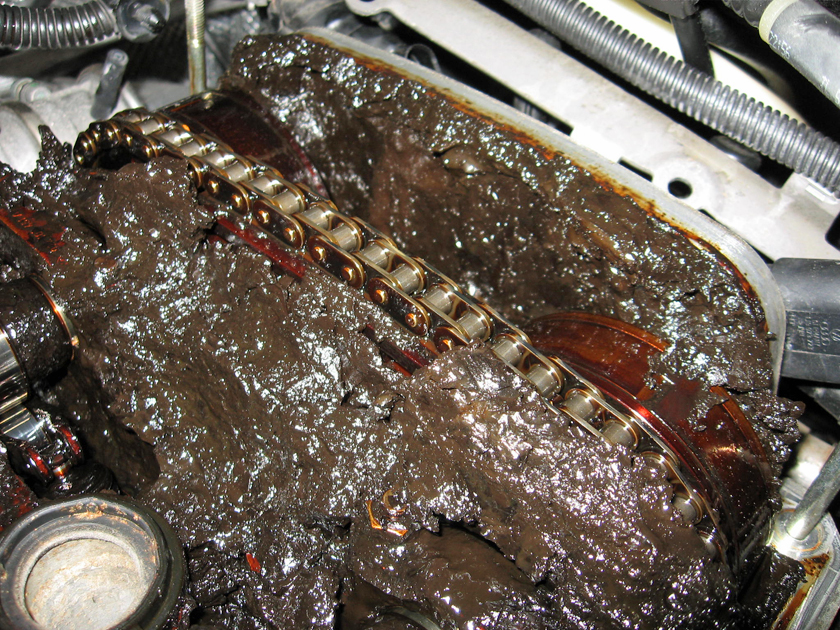Have you ever noticed your vehicle’s engine oil looking like sludge / mud, or chocolate milk? It may be concerning to see, but there are reasons behind this phenomenon. In this article, we will explore why engine oil can turn into sludge and how it can harm your car.

Credit: www.mvsottawa.com
What Causes Engine Oil to Turn into Sludge / Mud?
Engine oil sludge is a thick gel-like substance that forms when the engine oil becomes oxidized and contaminated. It is made up of partially burned fuel, metal fragments, and dirt. As the oil circulates through the engine, it picks up these contaminants, which accumulate, forming sludge.
One of the main reasons for the formation of oil sludge is the failure of the Positive Crankcase Ventilation (PCV) valve. This valve is responsible for removing gases from the engine and directing them back into the combustion process. When the PCV valve fails, these gases mix with the oil, leading to oxidation and the formation of sludge.
Contamination by Water
Motor oil turns milky brown when contaminated by water. Water intrusion into the oil could be a sign of a failed engine gasket. This often occurs when coolant from the vehicle’s cooling system seeps into the engine oil due to a gasket failure.
Read More: Why is Engine Oil Milky?
Oil Sludge Formation
Oil sludge is a gel-like substance formed from oxidized and contaminated engine oil. This sludge comprises partially burnt fuel, metal fragments, and dirt. When present in the oil, it can stick to various engine components, giving the oil a muddy appearance.
Possible Causes
If your oil looks muddy or like chocolate milk, there’s a high chance that coolant is leaking into either the combustion chamber or crankcase. This indicates a gasket failure, possibly an intake gasket or head gasket issue.
Oxidation and Contamination
Oil oxidation occurs when oil is exposed to extreme temperatures for a prolonged period. During oxidation, oil molecules break down and combine with dirt, fuel, metallic particles, water, and coolant, forming a sticky sludge that can resemble mud.
Effects on Engine
When the oil in your engine appears muddy or contaminated, it poses risks to your vehicle’s performance and longevity. The presence of sludge and water in the oil can lead to lubrication issues, increased friction, and potential engine damage if not addressed promptly.
Diagnosis and Repair
If you notice your engine oil looking like mud, it is advisable to consult a professional mechanic for a thorough inspection. They can identify the root cause of the issue, whether it’s a gasket failure, coolant leakage, or other underlying problems, and recommend the necessary repairs.
The Effects of Engine Oil Sludge
Engine oil sludge can cause numerous problems for your car. Firstly, it can lead to decreased fuel economy as it reduces the efficiency of the combustion process. This means you will need more fuel to achieve the same level of performance.
Additionally, oil sludge can clog important components of your engine, such as the oil passages and the oil pump. This can result in reduced oil flow and inadequate lubrication, leading to increased friction and wear on engine parts. Over time, this can cause serious damage and expensive repairs.
Engine overheating is another consequence of oil sludge. The sludge acts as an insulator, trapping heat instead of dissipating it. This puts extra strain on the radiator and cooling system, making them work harder to maintain optimal temperatures.

Credit: www.europeanautotech.net
Can Oil Sludge Be Fixed?
If you notice your engine oil looking like sludge, it’s important to take action to prevent further damage. One way to address this issue is by using an engine degreaser specifically designed to remove oil sludge. These degreasers contain powerful substances that dissolve and remove the sludge, improving engine performance.
Regular oil changes and adhering to recommended oil service intervals are also crucial to prevent the buildup of sludge. Using high-quality oil and ensuring that the PCV valve is functioning properly can help prevent the formation of sludge in the first place.
Conclusion
In conclusion, engine oil turning into sludge is a common problem that can have serious implications for your car’s performance and longevity. Understanding the causes behind oil sludge formation and taking proactive measures to prevent it can help you avoid costly repairs and extend the lifespan of your engine. Remember to prioritize regular oil changes and proper maintenance to keep your engine running smoothly.
